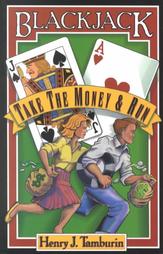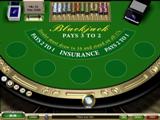
Blackjack: Take The Money and Run

Doubling Down Strategies
Let’s face it, most of the hands you are dealt in blackjack are losers. In fact, for every 100 hands that you play you are destined to lose 53 of them on average, and only win 47. With that kind Henry Tamburin is the editor and publisher of the Blackjack Insider Newsletter and author of the best-selling Blackjack: Take the Money & Run. He is also the lead Instructor for the Golden Touch Blackjack course, a feature writer for Casino Player magazine (and 6 other publications); an owner of a casino gambling publishing company (www.rsucasinobooks.com) and the host of www.smartgaming.com. For a free three month subscription to the Henry's Blackjack Insider Newsletter with full membership privileges go to www.bjinsider.com/free. Henry's website is www.smartgaming.com of odds facing a blackjack player, how is it possible to win?
Henry Tamburin is the editor and publisher of the Blackjack Insider Newsletter and author of the best-selling Blackjack: Take the Money & Run. He is also the lead Instructor for the Golden Touch Blackjack course, a feature writer for Casino Player magazine (and 6 other publications); an owner of a casino gambling publishing company (www.rsucasinobooks.com) and the host of www.smartgaming.com. For a free three month subscription to the Henry's Blackjack Insider Newsletter with full membership privileges go to www.bjinsider.com/free. Henry's website is www.smartgaming.com of odds facing a blackjack player, how is it possible to win?
One way to attack the casino's edge in blackjack is to learn when to double down. This playing option was introduced into the game as a way for players to reduce the rather large edge the casino would have without it. But it’s up to the player to know when to exercise the doubling option and just as importantly when not too.
Learning the correct doubling down playing strategy will allow a blackjack player to either turn a losing hand into an overall winner or to minimize losses in a losing situation. This may seem confusing but it’s two important points that blackjack players must understand in order to know when it becomes advantageous to double down.
In general it’s not how often you win a hand that determines whether or not you should double down but rather what is your monetary gain per hand. The reason is that in some instances you actually will decrease your chances of winning. How can this be? Let’s take the example of the following hand.
6, 3 5
Player Hand Dealer Upcard
By analyzing this hand using a blackjack simulation software program, you can determine the percent of the times you will win when you hit compared to doubling down.
| Play | % Hands Won | % Hands Lost |
| Hitting | 59 | 41 |
| Doubling | 57 | 43 |
You actually win fewer hands when you double down compared to hitting. The reason is that when you double down you get only one draw card. If it was a deuce for example you are stuck with a 12 and could only win if the dealer breaks. On the other hand, if you hit and drew a 2, you could draw again to improve your total. Get the point? Because you get only one draw card when you double down you give up the option of drawing again when you are dealt a not-so-good card. This leads to an important point- doubling down will never increase your chances of winning a hand!
Having said that you are probably wondering why you would ever double down. Instead of focusing on the percentage of hands won let’s focus instead on how much money you would expect to make per hand by doubling vs. an alternate playing strategy.
Take the above example of being dealt a 9 against a dealer 5 upcard. If you bet $1 per hand after 100 hands how much would you be ahead?
If you hit you would win $59 and lose $41 for a net expected profit of $18.
If instead you doubled down you would win $2 57-times ($114 won) and lose $2 43-times ($86 lost). Your net result would be an expected profit of $28.
When you compare the results of how much you expect to win by hitting vs. doubling down you see that doubling will gain you $10 more in profit over the 100 hands.
The bottom line is that it is better to bet $2 with a 57% chance of winning than $1 with a 59% chance of winning.
The criteria therefore that is used to determine when it becomes more profitable to double down is the average profit per hand (not the frequency of wins). By studying all possible hard hands against all possible dealer upcards, you arrive at the following doubling down playing strategy that meets the criteria.
Multiple Deck Games
Double hard 11 when the dealer’s upcard is 2 through 10.
Double hard 10 (except 5,5) when the dealer’s upcard is 2 through 9.
Double hard 9 when the dealer’s upcard is 3 through 6.
Single Deck Games
Always double on hard 11.
Double on hard 10 when the dealer’s upcard is 2 though 10.
Double on hard 9 when the dealer’s upcard is 2 through 6.
Double on hard 8 when the combination is a 5,3 against a dealer’s upcard of 5 or 6.
You can expect to be dealt a hard 9, 10, or 11 about eight times out of every 100 hands. If you follow the above doubling down strategy you can reduce the casino’s edge by about 1.3 percent.
Many casinos also allow players the option to double down on soft hands (hands that contain an ace counted as 11). This can be a good deal for players because if you know when to double soft hands you can reduce the casino’s edge by another 0.13 percent.
The reason for the monetary gain when you double on soft hands is not the same as doubling on hard totals. In the case of hard hands, your gain arises from the fact that when the dealer breaks you win double your bet or more likely you will outdraw the dealer and win the hand. With soft hands the emphasis is not so much on outdrawing the dealer as it is on getting more money on the table (by doubling) when the dealer is most vulnerable to busting. The latter is the major reason why doubling on soft hands is profitable.
As a general rule you should double down on soft hands when the dealer shows a weak upcard like 5 or 6. The complete basic strategy for soft doubling is:
Double down on soft 13 and 14 when the dealer’s upcard is 5 or 6.
Double down on soft 15 and 16 when the dealer’s upcard is 4, 5 or 6.
Double down on soft 16 and 17 when the dealer’s upcard is 3, 4, 5, and 6.
Most casinos will allow a player to double down for less than the initial wager. May novice players will do this when they are unsure of their chance of success or simply don't have the bankroll. This is a big mistake. You should always take full advantage of doubling by always doubling for the full amount.
Doubling also is a smart play made by players in blackjack tournaments especially on the last hand. If you are behind the leader and you need to win more money to overtake him, then doubling down is a smart play.

